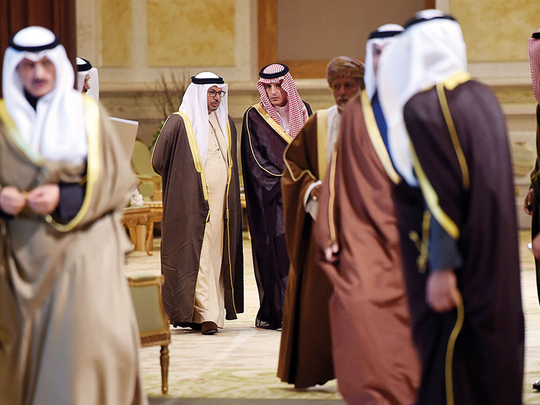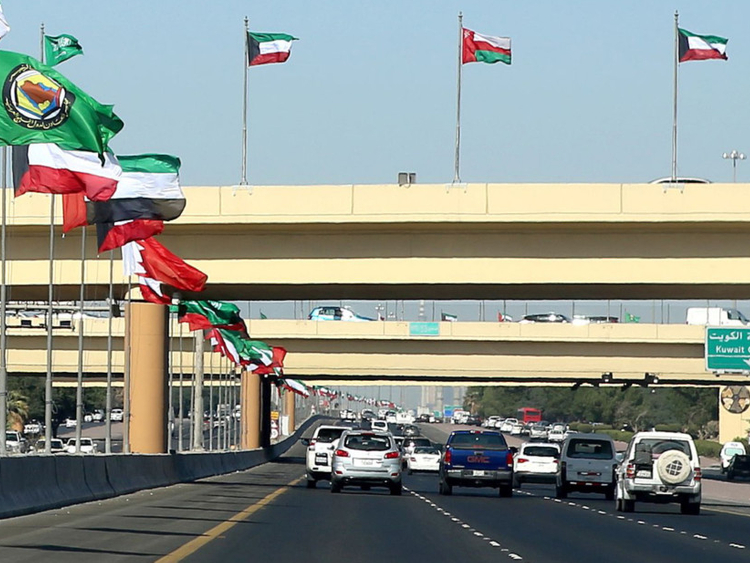
Abu Dhabi: The 38th Gulf Cooperation Council (GCC) Summit, set to be held in Kuwait on Tuesday and Wednesday faces the challenging task of consolidating the Gulf family, to reinforce its security being breached by Iran’s expansionist project, analysts said yesterday.
Speaking to Gulf News on the eve of the crucial summit, analysts argued this consolidation can only be achieved through, not reconciliatory, but honest and candid dialogue, in order to eliminate the issues currently obstructing true cooperation between GCC member states.
“The summit should rearrange the Gulf House to cement its security and foil any breaches by foreign forces including Iran’s expansionist project,” Dr Yousuf Al Hassan, a leading Emirati political analyst, told Gulf News.
Dr Al Hassan affirmed the reorder of the Gulf House can only be made by honest and candid but not reconciliatory talks to address all issues and obstacles that curtailed the true Gulf cooperation and integration.
A ministerial meeting was due to kick off this evening (Monday) ahead of the summit, First Deputy Prime Minister and Foreign Minister of Kuwait Shaikh Sabah Al Khalid Al Hamad Al Sabah said on Sunday.
Dr Al Hassan said the summit will testify that the Qatar crisis can only be settled from within the GCC.
“Qatar has repeatedly attempted to internationalise the crisis, but it failed. Now we hope the GCC Sunmmit will bring about a purely internal collective solution to the crisis with Qatar, that even the major world powers could not come up with solution to or break the consensus of the Gulf countries on their approach to resolving it,” Dr Al Hassan said.
Dr. Al Hassan added in the wake of the six month Qatar rift, the world has become convinced of the necessity of keeping the GCC active and united because it represents a strategic necessity for peace and security in the world.
“The Qatar rift seems to argue in favour of reinforcing the GCC rather than dismantling it. The row is internal to the Gulf countries and requires a solution from inside the Gulf, a solution that is in keeping with and protective of the Gulf’s specificities and sensitivities,” Dr Al Hassan said.
Dr Abdul Khaleq Abdullah, a leading political analyst, told Gulf News on the phone from Kuwait this summit is perhaps the most crucial one in 37 years – since the Gulf Cooperation Council was founded in Abu Dhabi in 19881.
“The significance of this summit lies in the challenge of addressing the gravest crisis it faced in more than 37 years. The GCC has seen its share of splits and disagreements. But, the Qatar crisis is by far the worst and most threatening in terms of politics, security and economy. The fact that this summit is being held in Kuwait is a huge achievement, regardless of any outcome or decisions to be announced towards any issue, including Iran, Yemen and Syria. All these issues are secondary, compared to Kuwait’s and the Gulf leaders’ determination to hold the summit on time,” Dr Abdullah said.
Dr Abdullah stressed cooperation among the Gulf countries is superior to any crisis, split or disagreement.
Dr Abdul Rahim Al Shaheen, professor of politics and dean of the Arabic Language Department at the Higher Colleges of Technology (HCTs), said the Gulf Summit is all about getting together and of theGulf heads of states and rallying the ranks of the GCC member countries.
Dr Al Shaheen said the UAE accepted the invitation to attend the summit out of its responsibility to rally the Arab and Gulf ranks and out of appreciation to the Kuwait’s Amir of diplomacy Shaikh Sabah Al Ahmad Al Jaber Al Al Sabah.
“The UAE’s is attending the summit out of its conviction that the Gulf countries should come together to build momentum around a common, forward-looking agenda. One that values security and stability but that at the same time recognizes the urgent need to improve the lot of our fellow Arabs throughout the region,” Dr Al Shaheen said.
Dr Al Shaheen said that the UAE has always sought to bring about a radical solution to the Qatar crisis, to buttress the Arab and Gulf peace and security, despite Doha’s intransigence.
Dr Fayez Al Nashwan, professor of international relations at Kuwait University, said Kuwait’s tireless efforts and determination were cuminated in holding the GCC Summit on time and with all GCC members attending.
He affirmed the Kuwait Summit will bring about a solution to the Qatar rift. “There has already been a solution to the crisis, but the problem lies in guarantees that Qatar commits itself to the quartet’s demands, once an agreement signed during the summit,” Dr Al Nashwan said.
Saudi Arabia, along with the UAE, Bahrain and Egypt, severed ties with Qatar on June 5 over what they described as Doha’s interference in their countries’ internal affairs and its support for radical groups, such as the Muslim Brotherhood, designated as a terrorist organisation in all four countries.
Instead of seriously addressing concerns of the Arab quartet and thus returning to the GCC fold, Doha opted to manoeuvre by protesting against the boycott at international organisations and shifting closer to Iran, a move which undermines the Gulf security.
Qatar’s neighbours said on July 5 they had received a “negative response” to the 13-point list of demands presented to Qatar on 22 June. In return for ending the restrictions, they had told the emirate to:
◾Curb diplomatic ties with Iran and close its diplomatic missions
◾Sever all ties to “terrorist organisations” and hand over “terrorist figures”
◾Stop all funding for individuals or organisations designated as terrorists by Saudi Arabia, the UAE, Egypt, Bahrain, the United States and other countries
◾Shut down Al Jazeera and other Qatar-funded news outlets
◾Close a Turkish military base and halt joint military co-operation inside Qatar
◾End interference in other sovereign countries’ internal affairs
◾Pay reparations and compensation for loss of life caused by Qatar’s policies
◾Align with other Arab countries militarily, politically, socially and economically
On 18 July, diplomats from the four nations boycotting Qatar said they were no longer insisting Qatar comply with the demands and instead wanted it to commit to six broad “principles”.
They were combating terrorism and extremism, denying financing and safe havens to terrorist groups, stopping incitement to hatred and violence, and refraining from interfering in the internal affairs of other countries.













